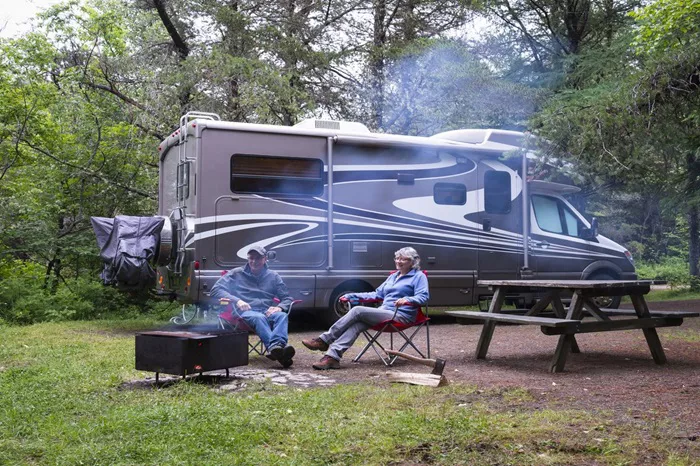Insurance coverage for Recreational Vehicles (RVs) is a crucial consideration for owners looking to protect their investment and ensure peace of mind while traveling. Understanding what insurance options are available and what they cover can help RV enthusiasts make informed decisions.
Types of RV Insurance Coverage
Comprehensive Coverage
Comprehensive coverage is a critical component of RV insurance, offering extensive protection against a wide range of risks beyond collisions. Here’s a detailed look at what comprehensive coverage typically includes:
Coverage Details
Comprehensive insurance generally protects your RV from:
Theft and Vandalism: Coverage extends to theft of the entire RV or its components, as well as damage caused by vandalism.
Natural Disasters: Events such as hurricanes, tornadoes, floods, earthquakes, and wildfires are typically covered.
Fire and Smoke Damage: Comprehensive policies reimburse repair costs if your RV is damaged by fire or smoke.
Collision with Animals: Damage resulting from collisions with wildlife, such as deer, is covered under comprehensive insurance.
Falling Objects: Protection includes damage caused by falling tree branches, debris, or other objects.
Exclusions
While comprehensive coverage is extensive, it may not cover:
Mechanical Breakdowns: Repairs due to mechanical failures or wear and tear are typically excluded.
Deliberate Damage: Intentional damage caused by the RV owner or another party is not covered.
Rodent or Insect Damage: Damage caused by pests inside the RV is usually excluded from comprehensive policies.
Loss of Personal Items: Personal belongings inside the RV may not be covered; separate personal property coverage may be needed.
Coverage Limits and Deductibles
Policy Limits: Insurance policies may have maximum payout limits for comprehensive claims, which can vary based on the insurer and policy terms.
Deductibles: Like other types of insurance, comprehensive coverage often requires a deductible amount to be paid by the policyholder before the insurance kicks in. Higher deductibles typically lower monthly premiums but increase out-of-pocket expenses at the time of a claim.
Importance of Comprehensive Coverage
Comprehensive insurance is crucial for RV owners because:
Financial Protection: It provides financial protection against costly repairs or replacements due to unforeseen events.
Peace of Mind: Knowing your RV is covered against a broad range of risks allows you to enjoy your travels without worrying about potential damages.
Lender Requirements: If you financed your RV, comprehensive coverage may be required by your lender to protect their investment until the loan is paid off.
Liability Coverage
Liability coverage is a fundamental component of RV insurance, designed to protect you financially if you’re responsible for injuries or damages to others.
Coverage Details
Liability insurance typically includes:
Bodily Injury Liability: Covers medical expenses, lost wages, and legal fees if someone is injured in an accident involving your RV.
Property Damage Liability: Pays for repairs or replacement costs if your RV damages someone else’s property, such as vehicles, buildings, or structures.
Recommended Coverage Limits
Experts recommend sufficient liability coverage to protect your assets in case of a lawsuit arising from an accident.
Minimum state-required limits may not adequately cover all expenses, so consider higher limits based on your financial situation and potential risks.
Additional Considerations
Uninsured/Underinsured Motorist Coverage: Some RV insurance policies offer optional coverage that protects you if you’re involved in an accident with a driver who has insufficient insurance or none at all.
Medical Payments Coverage: Optional coverage that pays medical expenses for you and your passengers, regardless of fault in an accident.
Exclusions
Liability coverage may not apply to intentional acts, criminal activities, or business-related incidents involving your RV.
Policy exclusions vary by insurer, so review your policy carefully to understand what is and isn’t covered under liability insurance.
Policy Limits and Deductibles
Insurance policies often have maximum limits on liability coverage per accident or per occurrence.
Deductibles may not apply to liability insurance, as they typically relate to comprehensive or collision coverage.
Collision Coverage
Collision coverage is an essential part of RV insurance that helps protect your vehicle from damage caused by colliding with another vehicle or object, regardless of fault.
Coverage Details
Collision insurance typically covers:
Damage Repair or Replacement: Pays for repairs or replacement of your RV if it’s damaged in a collision with another vehicle, object, or if it overturns.
Single-Vehicle Accidents: Coverage extends to accidents where your RV hits a stationary object, such as a tree or fence.
Deductibles
Policyholders choose a deductible amount, which is the out-of-pocket expense you agree to pay before your collision coverage kicks in.
Higher deductibles usually result in lower premiums, while lower deductibles mean higher premiums but less expense at the time of a claim.
See Also: What Does Allstate RV Insurance Cover?
Limitations and Exclusions
Collision coverage typically does not cover mechanical breakdowns or wear and tear.
Damage from natural disasters, theft, vandalism, or other perils not related to collisions may not be covered under collision insurance.
Importance of Collision Coverage
Financial Protection: Helps cover repair or replacement costs that can be substantial, especially for newer or more expensive RVs.
Lender Requirements: If you financed your RV, collision coverage may be required by your lender to protect their financial interest until the loan is paid off.
Additional Considerations
Actual Cash Value vs. Replacement Cost: Policies may offer either actual cash value (depreciated value) or replacement cost coverage for your RV. Replacement cost coverage typically results in higher premiums but provides coverage to replace your RV with a similar model if it’s totaled.
Personal Injury Protection (PIP)
PIP insurance covers medical expenses for you and your passengers regardless of fault in an accident.
Coverage Details
PIP coverage typically includes:
Medical expenses
Lost wages
Funeral expenses (if applicable)
State-Specific Regulations
PIP requirements vary by state, so it’s essential to understand local laws and coverage options.
Additional Coverage Options
Roadside Assistance
Roadside assistance coverage provides support for towing, tire changes, fuel delivery, and other emergency services while on the road.
Coverage Benefits:
Roadside assistance can offer peace of mind and convenience during RV trips, especially in remote areas.
Full-Time RV Insurance
Full-time RV insurance is designed for those who live in their RVs year-round or for extended periods.
Coverage Considerations:
This specialized insurance may include:
Enhanced liability protection
Coverage for personal belongings inside the RV
Temporary housing or transportation expenses if the RV becomes uninhabitable
Choosing the Right Insurance Company
Research and Compare Quotes
Obtain quotes from multiple insurance companies to compare coverage options and premiums.
Consider factors such as customer reviews, financial strength ratings, and claims processing reputation.
Policy Customization
Look for insurers that offer customizable policies to tailor coverage to your specific RV and travel needs.
Discuss optional add-ons and endorsements that enhance coverage based on your preferences.
Conclusion
Choosing the right insurance coverage for your RV involves understanding the types of coverage available, evaluating your individual needs, and selecting a reputable insurance company. By securing comprehensive protection, RV owners can enjoy their travels with confidence, knowing they are financially protected against unforeseen events.
FAQs
1. Do I need special insurance if I live in my RV full-time?
Yes, full-time RV living typically requires specialized insurance coverage. Standard recreational vehicle insurance may not adequately cover the unique risks associated with full-time residency, such as personal belongings coverage, liability protection, and coverage for temporary living expenses if your RV becomes uninhabitable.
2. Does RV insurance cover personal belongings inside the RV?
Yes, many RV insurance policies offer coverage for personal belongings stored inside the RV. This coverage helps reimburse you for the loss or damage of items such as clothing, electronics, and kitchen appliances due to covered perils like theft, fire, or vandalism. It’s essential to review your policy’s limits and exclusions to ensure your valuable possessions are adequately protected.
3. Can I add additional drivers to my RV insurance policy?
Yes, most RV insurance policies allow you to add additional drivers to your coverage. It’s important to disclose all regular drivers of the RV to ensure they are properly insured in case of an accident. Insurance companies may consider factors such as the drivers’ ages, driving histories, and relationship to the policyholder when determining premiums and coverage options.






















